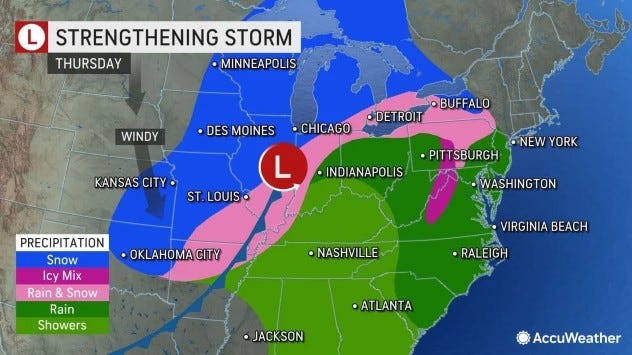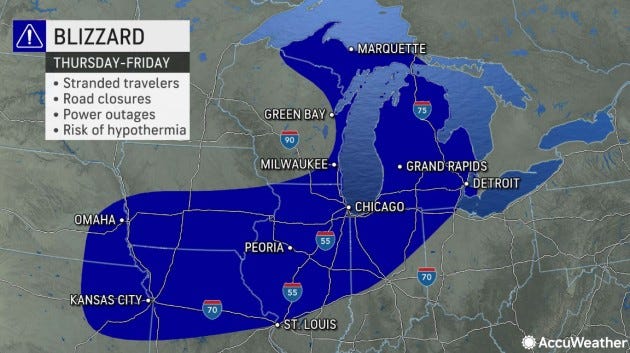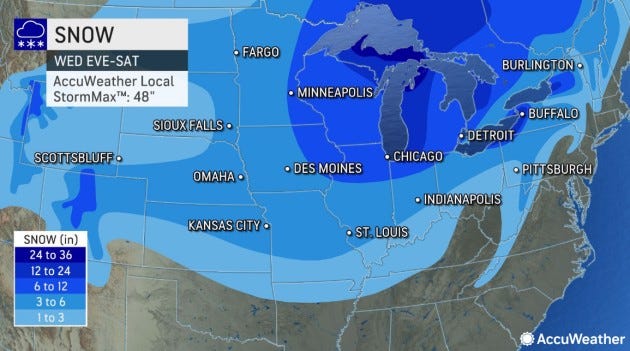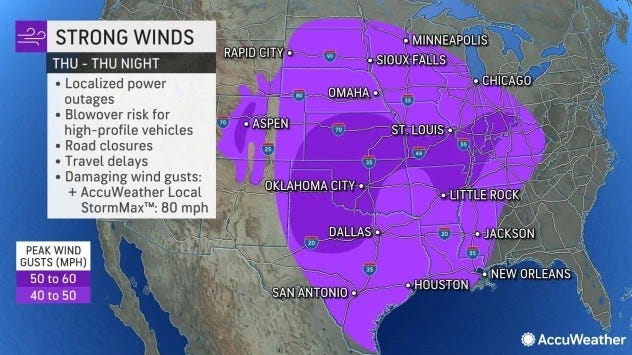
SOUTHFIELD (WWJ) — Millions of Michiganders are in the path of a brutal winter storm forecasted to bring frigid air, strong winds, blowing snow and ice across the Midwest — and meteorologists are raising the alarm bells.
"A lot of people have a lot of things to do, but I really want you to be understanding that you are going to be impacted by the storm, not only locally but nationally," WWJ AccuWeather meteorologist Dean Devore said of the storm set to hit Michigan beginning Thursday evening.
The National Weather Service said blizzard conditions are possible with potential wind gusts in excess of 50 mph. Snowfall totals are expected in excess of 6 inches for some areas.
"Just the very nature of the storm — a blizzard — a major wind maker for the upper Midwest and the Great Lakes and then wind and rain problems, coastal flooding along the east coast before they get into the cold air and rapidly freeze up sending them into the coldest Christmas in decades," DeVore explained. "Same here in in Detroit."

Wind chill values are expected to drop some 5 to 15 degrees below zero at times in Southeast Michigan, creating "very dangerous" conditions if long-lasting power outages occur.
"We're going to have the coldest Christmas in decades," DeVore said. "Right now we're in the mid to upper 20s. As we go through the day dry and cold clouds some sun the high about 32 upper 20s.
Tonight, and then tomorrow, a little mix going over to snow temperatures mid to upper 30s and then the snow really gets going tomorrow night into Friday as the wind picks up, too."
DeVore said temperatures will end up in the teens. Friday's high will be 20° to 24°, but Real Feel temperatures will be in single digits and falling to below zero.
"I think the temperatures end up in the single digits above zero and Real Feels 20 to 30 below," DeVore added.
The National Weather Service warned travel could be very difficult to near impossible during the storm. Widespread blowing snow has the ability to significantly reduce visibilities to near zero with whiteout conditions. Drifting snow could hamper snow removal operations.
Meteorologists said hazardous conditions may impact the morning and evening commutes Friday, putting a damper on holiday travel. Strong winds may bring down tree branches and cause scattered to widespread power outages.

"Prepare for possible blizzard conditions," the NWS said. "If you must travel, have a winter survival kit with you. If you get stranded, stay with your vehicle."
The wind will be another potentially hazardous condition as the storm undergoes quick intensification across the center of the country during the week, Accuweather explained.
As the pressure drops, winds will come cascading in and swirl at high speeds around the center of the storm.
"Strong winds are expected on the back side of the storm, bringing gusts in excess of 40 mph from the northern Plains all the way to the Texas Gulf Coast," said AccuWeather Meteorologist Jake Sojda.
Isolated pockets can see even stronger winds up to 70 or 80 mph from northern Texas into the Great Lakes by week's end, forecasters say.

So what can Michiganders do now to prepare for such a storm?
The state's Emergency Management and Homeland Security along with the Michigan State Police said residents should be aware that winter storms can cause power outages that last for days. They can make roads and walkways extremely dangerous and also negatively affect critical community services including public transportation, childcare, and health programs.
Injuries and deaths may occur from exposure, dangerous road conditions, carbon monoxide poisoning, and other winter storm conditions. To be better equipped, they suggest the following:
Now/Prepare
• Sign up for local alerts and warnings.
• Create and test emergency communication plan(s).
• Stock emergency supplies, and install battery-powered or battery backed-up carbon monoxide detectors and smoke detectors.
• Winterize your home. Visit this page to help you prepare.
• Review your property insurance, and safeguard critical documents.
• Get trained on specific needs your family may have. Also, consider joining your local Community Emergency Response Team (CERT).
• Identify a place nearby where you can safely warm up should you lose heat in your home.
During/Survive
• Stay indoors and off the roads. If you must drive, keep emergency supplies in your car.
• Close off rooms to consolidate and retain heat.
• Dress in layers, and use blankets to stay warm.
• Bring pets into a warm place and out of the storm or severe cold.
• Never use a generator, camp stove, charcoal grill, or gasoline or propane heater indoors, as these items can start accidental fires, cause electric shock, and/or cause deadly carbon monoxide poisoning.
• Never heat a home with a cooktop or oven.
• Limit your time outdoors, and stay dry.
After/Be Safe
• Only drive if necessary. Remove snow and ice from your tailpipe before starting your car, and check regularly if idling. Clean all snow and ice from your car before driving.
• Dress in warm clothing, stay dry, prevent prolonged exposure to cold and wind, and avoid overexertion clearing/shoveling snow. Overexertion can lead to a medical emergency.
• Monitor local news and alerts for emergency information and instructions.
Before you leave the house, tell your smart speaker "play WWJ nine-fifty" to hear weather and traffic updates every 10 minutes on the 8s. And download the free Audacy App and favorite WWJ to listen to us anywhere, anytime.

